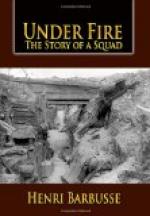The day matures. A little more light has trickled through the mists that enclose the earth. But the sky has remained overcast, and now it dissolves in rain; With a slowness which itself disheartens, the wind brings back its great wet void upon us. The rain-haze makes everything clammy and dull—even the Turkey red of Lamuse s cheeks, and even the orange armor that caparisons Tulacque. The water penetrates to the deep joy with which dinner endowed us, and puts it out. Space itself shrinks; and the sky, which is a field of melancholy, comes closely down upon the earth, which is a field of death.
We are still there, implanted and idle. It will be hard to-day to reach the end of it, to get rid of the afternoon. We shiver in discomfort, and keep shifting our positions, like cattle enclosed.
Cocon is explaining to his neighbor the arrangement and intricacy of our trenches. He has seen a military map and made some calculations. In the sector occupied by our regiment there are fifteen lines of French trenches. Some are abandoned, invaded by grass, and half leveled; the others solidly upkept and bristling with men. These parallels are joined up by innumerable galleries which hook and crook themselves like ancient streets. The system is much more dense than we believe who live inside it. On the twenty-five kilometers’ width that form the army front, one must count on a thousand kilometers of hollowed lines—trenches and saps of all sorts. And the French Army consists of ten such armies. There are then, on the French side, about 10,000 kilometers [note 2] of trenches, and as much again on the German side. And the French front is only about one-eighth of the whole war-front of the world.
Thus speaks Cocon, and he ends by saying to his neighbor, “In all that lot, you see what we are, us chaps?”
Poor Barque’s head droops. His face, bloodless as a slum child’s, is underlined by a red goatee that punctuates his hair like an apostrophe: “Yes, it’s true, when you come to think of it. What’s a soldier, or even several soldiers?—Nothing, and less than nothing, in the whole crowd; and so we see ourselves lost, drowned, like the few drops of blood that we are among all this flood of men and things.”
Barque sighs and is silent, and the end of his discourse gives a chance of hearing to a bit of jingling narrative, told in an undertone: “He was coming along with two horses—Fs-s-s—a shell; and he’s only one horse left.”
“You get fed up with it,” says Volpatte.
“But you stick it,” growls Barque.
“You’ve got to,” says Paradis.
“Why?” asks Marthereau, without conviction.
“No need for a reason, as long as we’ve got to.”
“There is no reason,” Lamuse avers.
“Yes, there is,” says Cocon. “It’s—or rather, there are several.”
“Shut it up! Much better to have no reason, as long as we’ve got to stick it.”




